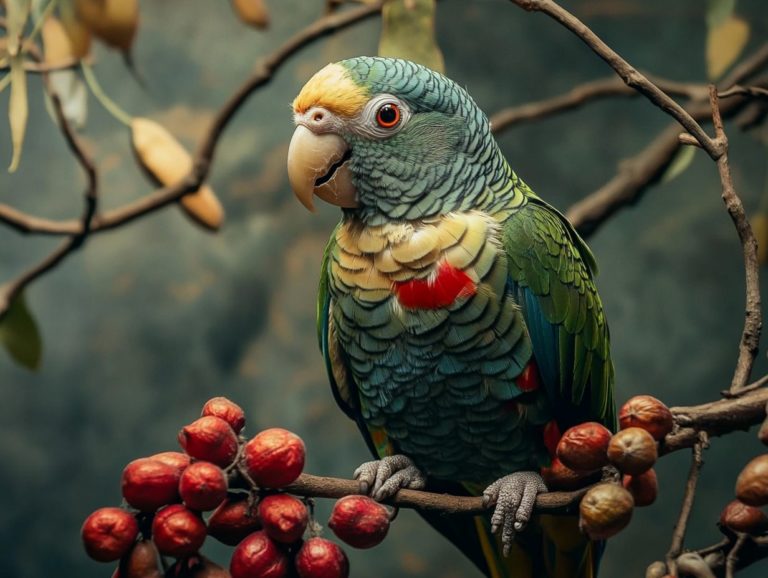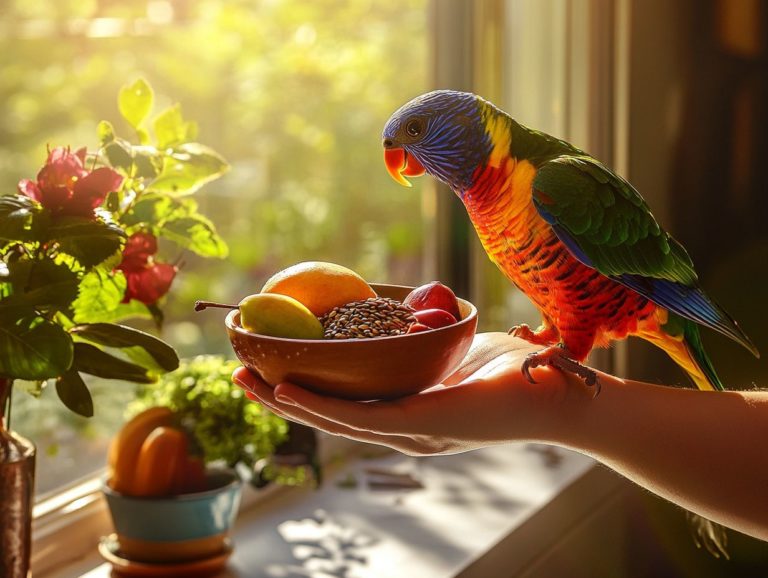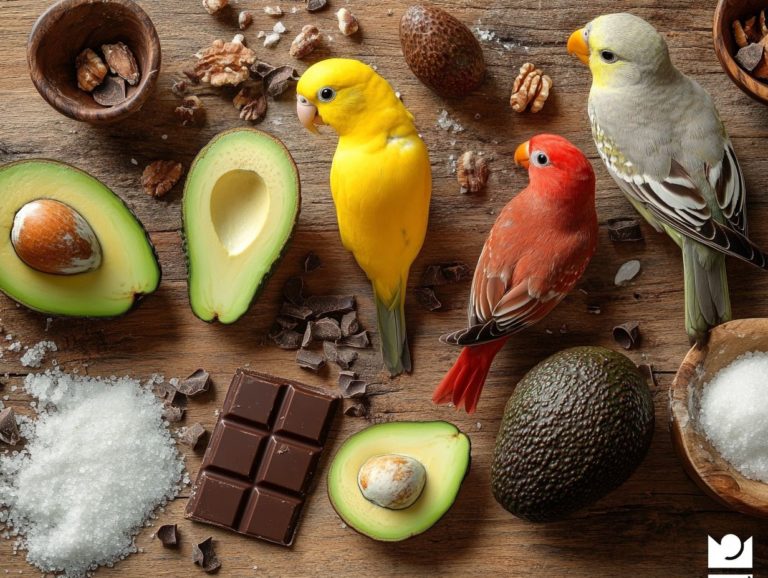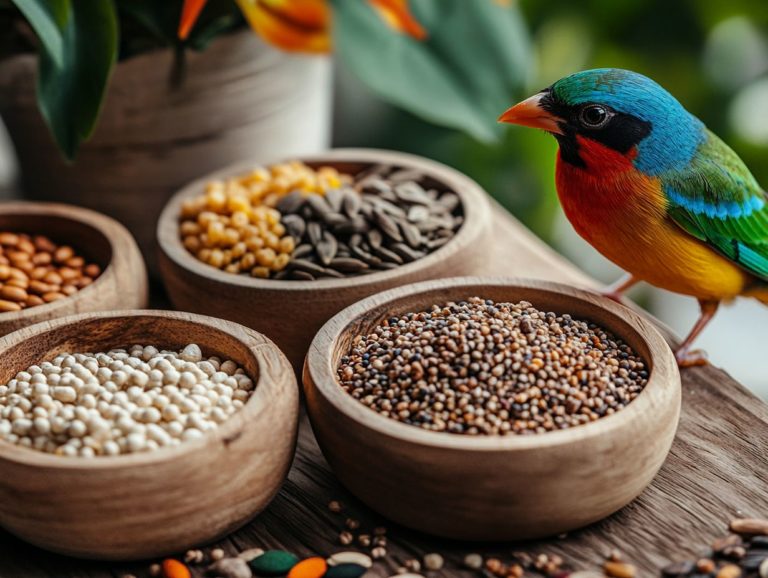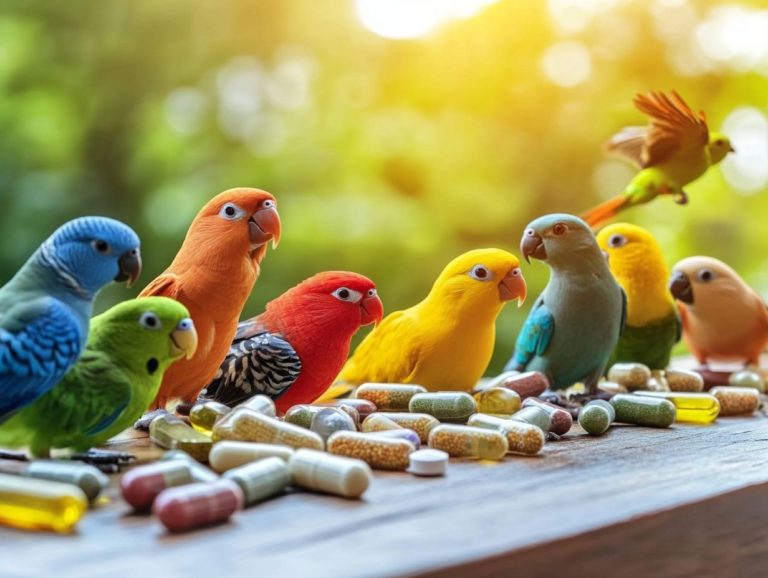The Role of Water in Your Pet Bird’s Diet
Water is an essential element for your pet bird’s overall health and well-being. Just like you, your feathered companion depends on proper hydration to thrive, making it a crucial part of their diet.
This article delves into the importance of water for your avian friends. It helps you recognize the signs of dehydration and offers best practices for providing fresh, clean water. It also compares various types of water and shares tailored tips for specific bird species.
Understanding the role of water in your bird’s health is vital. Continue reading to ensure your feathered friend remains happy and hydrated!
Contents
- Key Takeaways:
- The Importance of Water for Pet Birds
- Signs of Dehydration in Pet Birds
- Providing Water for Your Pet Bird
- Types of Water for Pet Birds
- Watering Tips for Specific Types of Pet Birds
- Frequently Asked Questions
- What is the role of water in your pet bird’s diet?
- How much water should my pet bird be drinking?
- What are the signs of dehydration in a pet bird?
- Do pet birds need more water in certain situations to meet their dietary needs?
- Can my pet bird get enough water from their food?
- What can I do if my pet bird is not drinking enough water?
Key Takeaways:
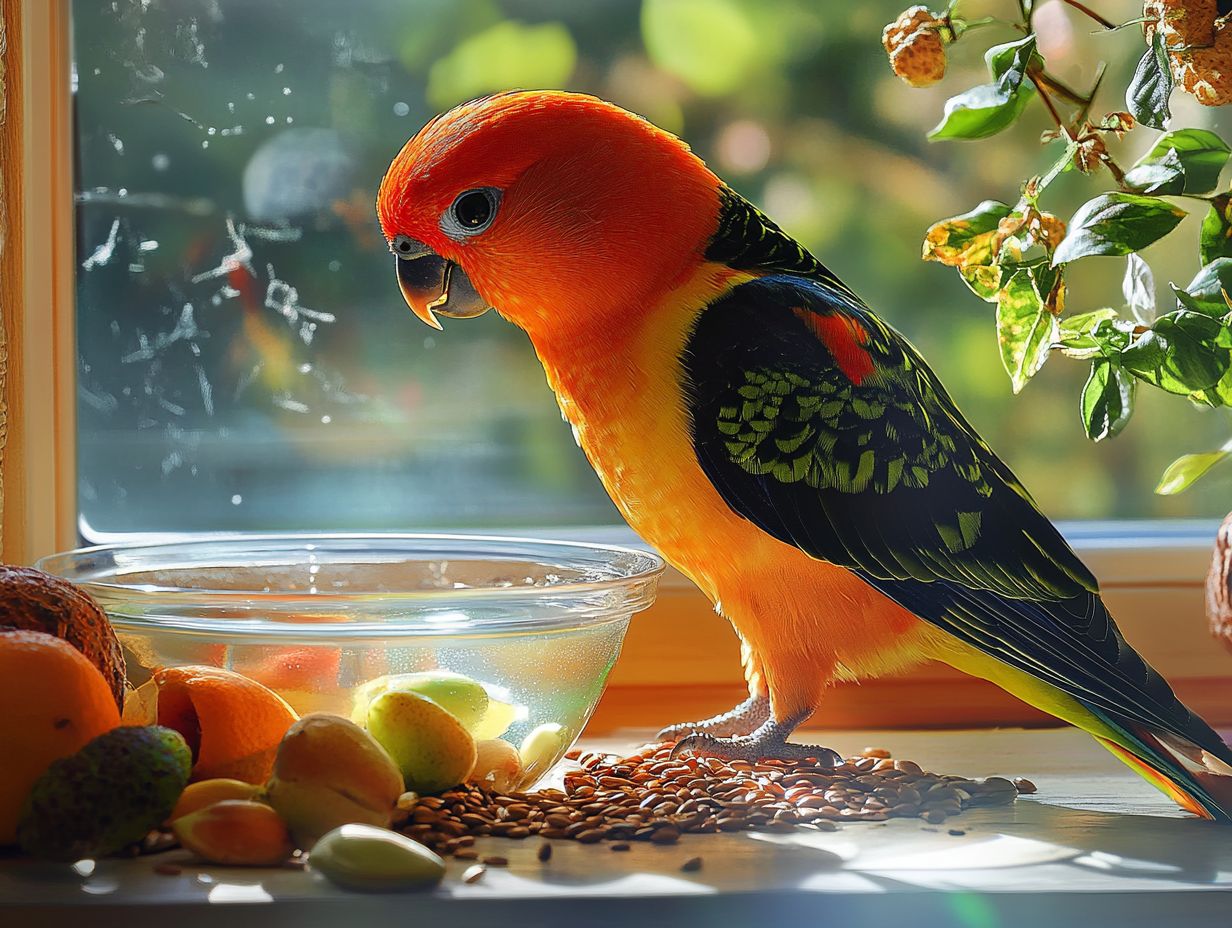
- Water is essential for the overall health and well-being of pet birds, serving important functions such as maintaining body temperature and aiding in digestion.
- Signs of dehydration in pet birds can include lethargy, dry skin, and reduced appetite. Monitor your bird’s water intake to ensure they are adequately hydrated.
- Best practices for watering birds include providing fresh, clean water in a shallow dish that is easily accessible. Change the water daily to prevent bacterial growth.
The Importance of Water for Pet Birds
Water is a vital part of a balanced diet for your pet birds. It serves a critical role in their health, growth, and development just as vitamins, minerals, protein, and carbohydrates do.
Recognizing the significance of providing fresh and clean water can profoundly influence your birds’ lifespan and vitality, helping to prevent health issues like obesity and digestive problems.
Proper hydration enhances digestion and maintains energy levels. It supports their active lifestyle, which is essential for both breeders and dedicated pet owners.
Why Water is Essential for Birds
Water is an essential nutrient that aids in the digestion and absorption of food, playing a crucial role in the health of your pet birds.
It helps maintain optimal body functions by facilitating metabolic processes, regulating body temperature, and promoting waste elimination. Adequate hydration is vital; it helps transport nutrients and supports cell function, ensuring their bodies operate efficiently.
Insufficient water intake can lead to dehydration, resulting in severe health issues like kidney failure, reduced energy levels, and impaired digestion.
Regular access to fresh water is imperative. It enhances the vitality of your avian companions and promotes a longer, healthier life.
Signs of Dehydration in Pet Birds
Spotting signs of dehydration is vital for your bird s health, as even mild dehydration can escalate into serious health issues if not addressed.
While symptoms can vary by species, common indicators include lethargy, loss of appetite, and changes in droppings. These suggest that the bird s dietary needs are not being met.
Quickly identifying these signs can help avert severe repercussions that could impact your bird’s lifespan and overall health.
Identifying Symptoms and Risks
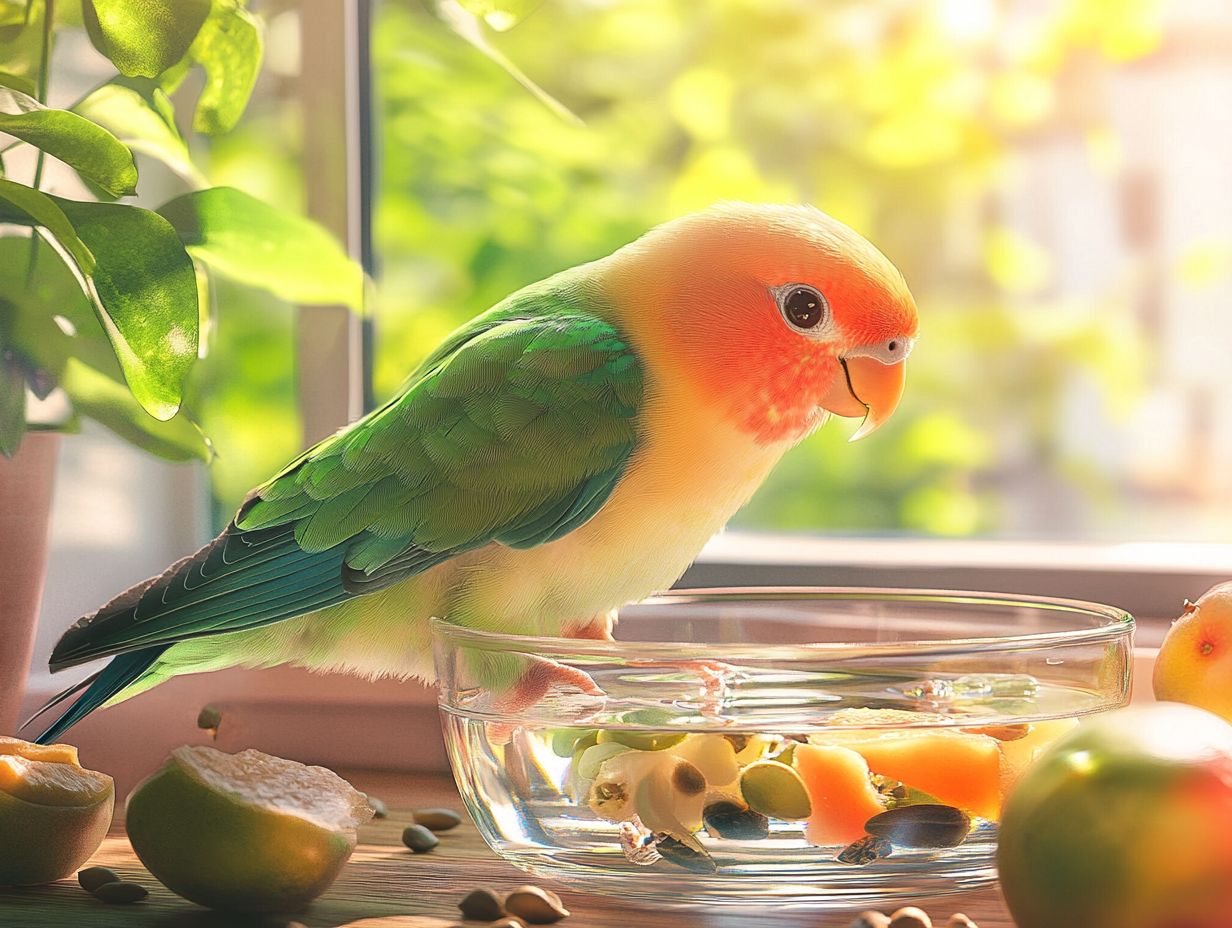
Identifying symptoms of dehydration in pet birds is essential. Neglecting this can lead to serious health risks that jeopardize their well-being.
Pay close attention to behavioral changes like lethargy, decreased vocalization, or altered eating habits these can be early warning signs of dehydration. Physical signs may include dry feathers, sunken eyes, or a fluffed appearance indicating distress.
Overlooking these indicators might raise the risk of severe health issues, including organ failure or increased susceptibility to infections. Ensure your feathered companions have regular access to clean, fresh water to maintain optimal hydration levels.
Stay vigilant and monitor for any concerning changes or symptoms. This can make all the difference in their health.
Check your bird’s water intake right away and consult a vet if you notice any signs of dehydration!
Providing Water for Your Pet Bird
Ensuring your pet bird has access to fresh, clean water is paramount in aviculture. This is vital for their health and hydration.
By regularly checking and changing their water sources, you can prevent common health issues such as obesity and digestive troubles. This practice also boosts their overall energy and well-being.
Mastering the best practices for providing water can profoundly impact your bird’s lifespan and quality of life.
Best Practices for Watering Birds
It’s essential to ensure that your pet birds have constant access to clean and fresh water for maintaining their hydration.
Choosing the right containers, whether water bottles or shallow bowls, significantly impacts their health. Opt for containers that are easy to clean. Hygiene is crucial; frequent cleaning ideally every day prevents bacterial growth and guarantees that your feathered companions drink safe water.
Some bird owners may prefer specialized water dispensers designed to limit contamination. Hydration is crucial not just for quenching thirst but also for overall well-being. This helps your birds maintain energy levels and supports vital bodily functions.
Types of Water for Pet Birds
Let s explore the best water options for your pet birds be it tap water, filtered water, or bottled water. Each type is essential for maintaining their hydration and ensuring it s free from contaminants.
Each option has different mineral content and potential additives that could impact your bird’s health and digestive system. By selecting the right water source, you can effectively prevent health issues and support a balanced diet, both vital for enhancing their lifespan.
Comparing Tap Water, Filtered Water, and Bottled Water
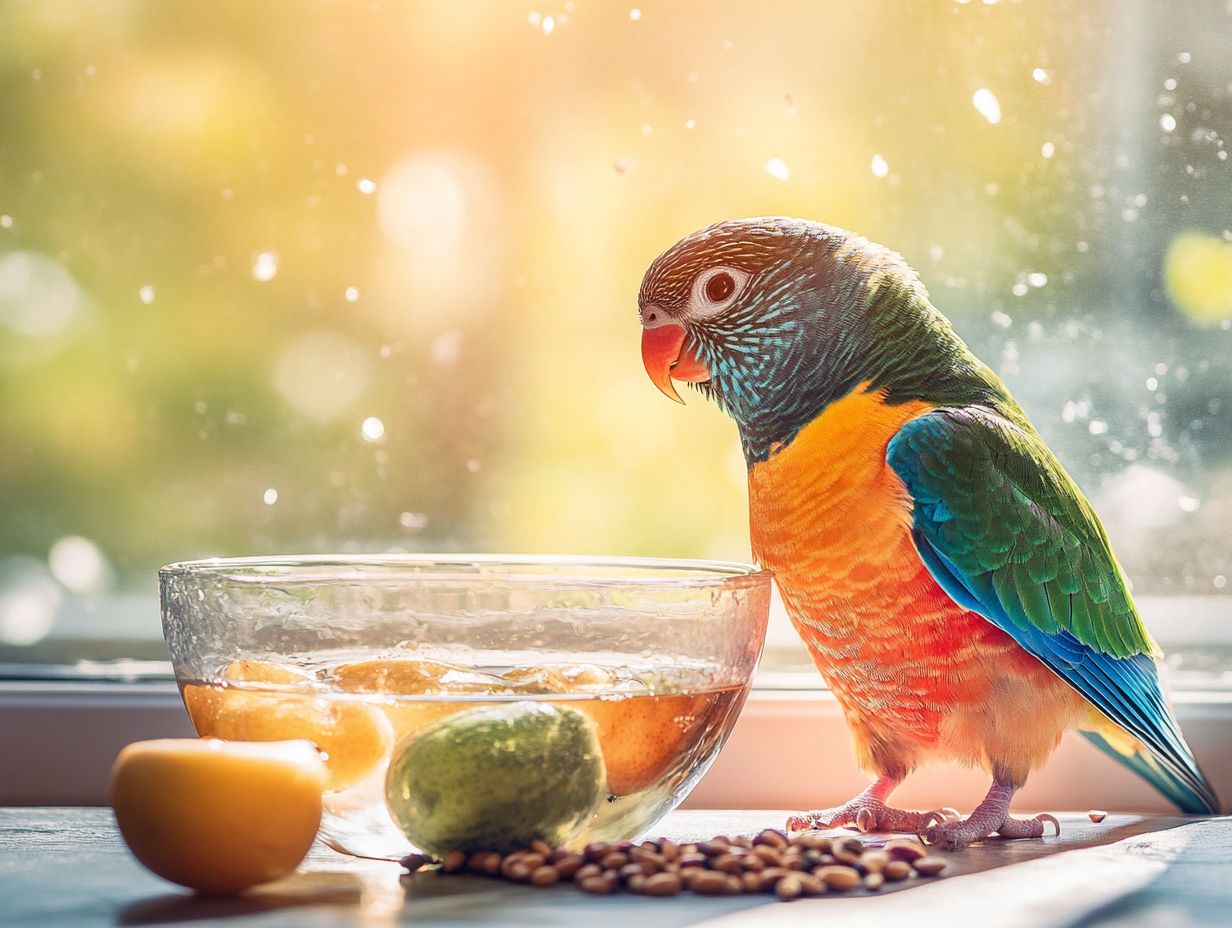
When weighing your options between tap water, filtered water, and bottled water for your pet birds, it s crucial to consider the health implications and potential contaminants associated with each choice.
Each water source varies in mineral content, significantly impacting the overall well-being and hydration of your feathered companions. Tap water often contains trace amounts of chlorine and heavy metals that can pose risks if consumed regularly. On the other hand, filtered water usually does a commendable job of removing these harmful substances, providing a safer alternative.
However, be aware that some filtration systems may also strip away essential minerals vital for your birds’ health. While bottled water is undoubtedly convenient, it can be pricey and might not provide the necessary nutrients unless it s specifically labeled as such.
By understanding how each water type addresses the hydration needs of pet birds, you can make well-informed choices for your cherished avian friends.
Watering Tips for Specific Types of Pet Birds
Watering tips for different types of pet birds can vary greatly depending on their species and specific hydration needs. It s essential for you, as an owner, to customize your approach to ensure your bird’s health and nutrition.
Different breeds, such as cockatoos or smaller parrots, have unique requirements regarding water access and quality. These can significantly influence their energy levels and vulnerability to health issues. By understanding these distinctions, you can provide the best care for your feathered companions.
Considerations for Different Species
When caring for pet birds, focus on their hydration and nutrition for good health.
For instance, cockatoos are vibrant companions. They thrive on a diet rich in fruits and vegetables, which helps their feathers shine.
These birds need fresh water daily. They can easily get dehydrated, especially in warmer climates.
Finches have unique needs as well. They flourish on a seed-based diet supplemented with greens.
Like cockatoos, finches need a consistent supply of clean water. Understanding their hydration and dietary needs is crucial to prevent serious health issues.
By providing tailored care, you enhance their vitality and enrich their lives.
Frequently Asked Questions
What is the role of water in your pet bird’s diet?
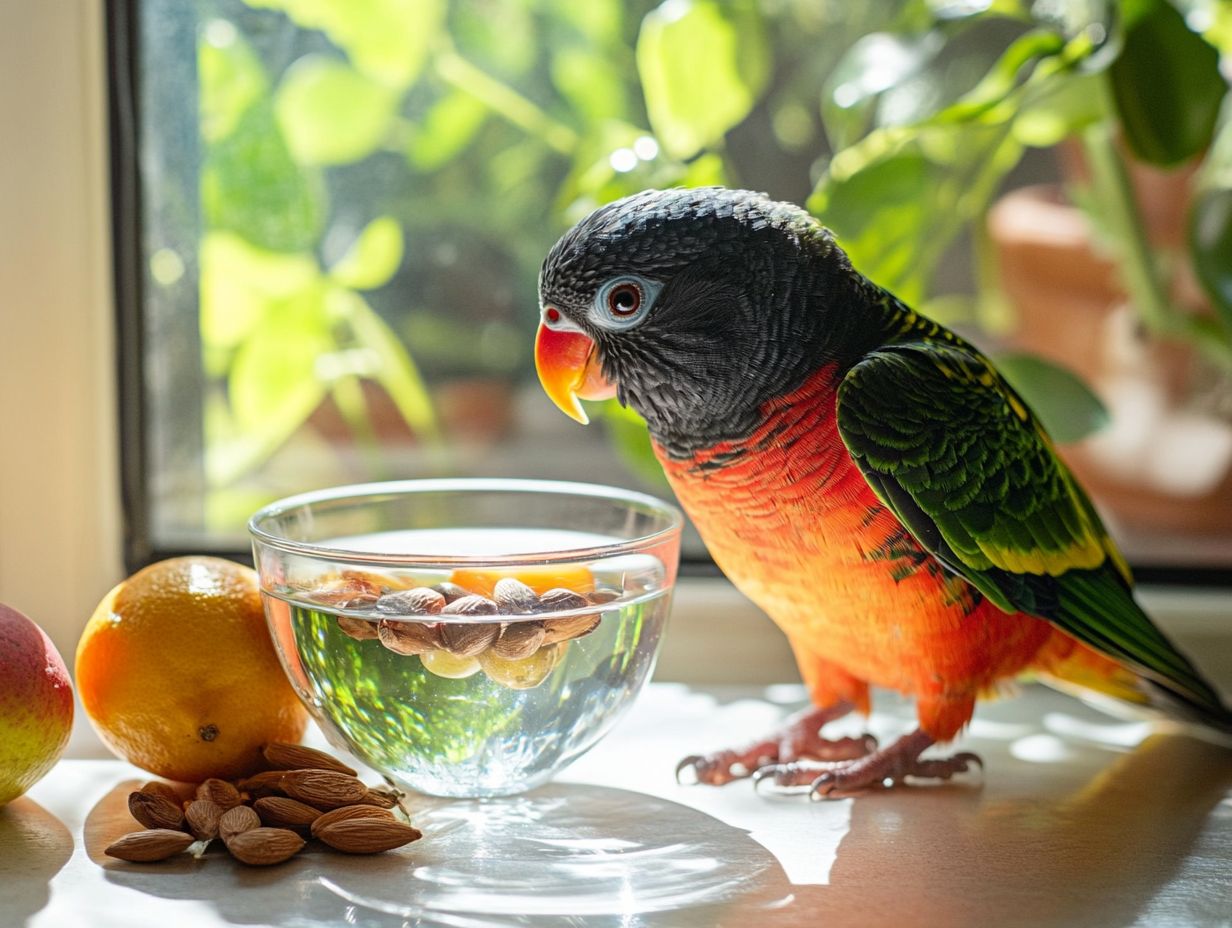
Water is essential for digestion, nutrient absorption, and overall health in birds.
How much water should my pet bird be drinking?
A pet bird typically drinks about 1.5-2 times its body weight in water daily. This amount can vary based on the bird’s size and activity level.
What are the signs of dehydration in a pet bird?
Signs include dry, sunken eyes, flaky skin, lethargy, and loss of appetite. Seek veterinary care if you suspect dehydration.
Do pet birds need more water in certain situations to meet their dietary needs?
Yes, they may require more water during hot weather or illness. Always keep fresh water available and monitor their intake.
Can my pet bird get enough water from their food?
While some fruits and vegetables contain water, they should not be the only source. Always provide a separate bowl of fresh water.
What can I do if my pet bird is not drinking enough water?
If your bird isn t drinking enough, try moving the water bowl or offering fresh fruits and vegetables to boost water intake.

